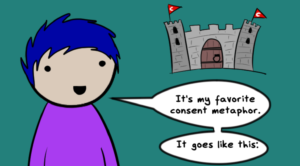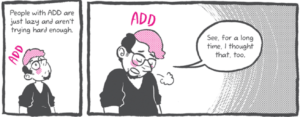“I know all your previous clinicians have diagnosed you with bipolar disorder,” my psychiatrist tells me, “which I’ll keep in mind. But I don’t think you have it.”
Right then and there, I wanted to grab my backpack and walk out the door. The idea that I had been misdiagnosed all of these years totally terrified me. If I wasn’t bipolar, what was I?
This diagnosis had been central to my identity as mentally ill, as an advocate, as a writer – and just like that, the rug was being pulled out from underneath me.
You can’t blame me for wanting to hightail it out of there. But as it turned out, it would become clear to me over the next few appointments that he was onto something.
Namely, that when we actually considered my trauma history, my complex symptoms, and the observations shared by my therapist, we found a whole new language to describe my struggle: borderline personality disorder, obsessive-compulsive disorder, C-PTSD, and attention-deficit disorder.
None of which, in my seven years of navigating rushed psychiatry appointments and disengaged doctors, had I ever been diagnosed with – much less treated for.
I learned a lot from that experience. Namely, that a diagnosis is just an opinion – an opinion that can vary drastically based on the competence of your clinician, the kinds of questions they ask, what you’re willing to share, and yes, the biases of every clinician involved.
I’ve been diagnosed with what feels like half the DSM over these last seven years, much of which didn’t sit right with me. I only now feel that we’re actually getting to the heart of what I’m dealing with – and I regret that it took this long to get there.
No one told me that I was allowed to disagree with a diagnosis.
No one told me which questions to ask when I received that diagnosis. In fact, I took every psychiatrist’s word for it, and instead of being an active participant in my treatment, I took the backseat.
I get that being diagnosed with a mental illness is overwhelming. Further, many of us just don’t know what the hell a good psychiatrist looks like (Sound familiar? I wrote about what to look for in this article).
Many of us enter into these clinical settings at our absolute worst but are still expected to advocate for ourselves anyway – a position that’s difficult to take on when we just need help.
So I want to share a little bit of what I’ve learned when it comes to getting that diagnosis. Because while a diagnosis is just an opinion, it’s an opinion that can alter the entire course of our treatment and recovery.
Take it from me. I was treated for seven years for a mental disorder I didn’t even have. Two hospitalizations later, countless lost jobs and opportunities, and dozens of failed medications, I’m only now getting the treatment I’ve needed all along.
I believe knowledge is power, as cliché as it sounds. And with this knowledge, I hope you’re able to better advocate for yourself when that label comes your way.
Here are five things to remember when you’re diagnosed.
1. A Diagnosis Is a Clinician’s Medical Opinion
Excluding a self-diagnosis, which has its place, a diagnosis is really just the opinion of one clinician.
Being diagnosed with a mental illness doesn’t mean that’s the final word on what you’re struggling with.
Clinicians can get it wrong.
And depending on how engaged your clinicians are, clinicians can get it wrong a few times before they actually get it right.
This can be, in part, because there’s a lot of overlap with diagnostic criteria. Borderline personality disorder happens to have a lot in common with bipolar disorder, for example, which is why I was misdiagnosed a handful of times.
C-PTSD can be mistaken for generalized anxiety or panic disorder if a clinician never asks about your trauma history – or if you elect not to share it.
Some of the distinctions between disorders are so subtle that even the best psychiatrist can miss it!
This doesn’t mean we shouldn’t trust our clinicians. Trust is important!
What it does mean, however, is that a healthy dose of skepticism doesn’t hurt. It means we should feel encouraged to ask questions, to get more information, and push back if it doesn’t resonate with us.
2. This Is a Tool – You Decide How to Use It
Everyone has a different reason for seeking out a diagnosis.
It’s important to remember that a diagnosis, fundamentally, should function as a tool that empowers you – not a sentencing that discourages you.
Some folks use a diagnosis to get access to certain treatments, like medication or specialized therapy. Some use it to get access to services, like state disability or disability services at their university.
Others use it as a jumping-off point to further educate themselves and others. A diagnosis can help them understand their own struggles, and direct them to specific communities – whether online or offline – that can help support them in their recovery.
And some people see it as validation, putting a name to it to help affirm that what they’re going through isn’t their fault. This was a primary motivator for me. I wanted to bring to light what had only operated in the shadows of my mind for so long.
Any one of these reasons is a valid reason. When you get a diagnosis, it’s good to put things into perspective and ask yourself, “How am I going to use this label to empower myself?”
If you’re not sure, this is a great opportunity to chat with a therapist and brainstorm the next steps for you as you process this new information.
Whatever you do, don’t treat a diagnosis as your final destination. A diagnosis should be a milestone in your recovery, but never the end point.
3. Stigma Can Impact the Diagnosis
This actually works both ways. I was extraordinarily reluctant to take on the diagnosis of borderline because it’s so highly stigmatized – and I was eager to distance myself from a label that I equated with being a “bad person.”
But similarly, some clinicians have been known to quickly write off “difficult patients” – particularly women – by misdiagnosing them with BPD or as histrionic, something that may not hold up when you delve further into their history.
Stigma is real. And it operates in pretty sinister ways.
This is why Black men, for example, are over-diagnosed with psychosis and under-diagnosed with depression. This is why eating disorders are often missed altogether in communities of color and, in particular, for folks of size.
And this is also why marginalized folks of many communities are reluctant to seek out help, as they don’t fit the “typical mold” of what a mentally ill person “should” look like.
Which is to say, prevailing cultural attitudes about mental illness can impact the diagnosis we believe we have, and the diagnosis a clinician gives us.
This is important to keep in mind as we receive a diagnosis, especially if we’re marginalized in some way. Is our resistance to a particular label rooted in stigma? Or could the diagnosis itself be steeped in prejudice?
These are worthwhile questions to explore, particularly if we’re lucky enough to have a culturally competent therapist on our team.
Psychiatry doesn’t exist in a culturally immune bubble.
In fact, as an ever-evolving field of study, our diagnosis is sometimes a reflection of the times: What is being over- or underdiagnosed at that moment? What knowledge is available to us? What do we understand – or have difficulty understanding – about certain symptoms or disorders?
And just the same, we carry our own biases. The quickness with which I initially rejected BPD is a testament to that, for sure. I had to check my own discomfort so I could finally get the treatment that I deserved.
It’s important to consider all of this whenever a new label comes into play. Any treatment that isn’t sensitive to bias, identity, and cultural differences simply isn’t competent care.
4. Your Opinion Is Important, Too
I think it’s essential that patients understand they can and should be active participants in their treatment.
This is something my own psychiatrist taught me and something I’m eternally grateful for.
This means you have permission to disagree, ask questions, and request more information – as much as you need to.
When my psychiatrist diagnosed me as borderline, I eventually worked up the courage to ask why.
He broke down some of the observations he had made, acknowledged that the way BPD operates for me is a little atypical, and further explained some of the DSM criteria that felt a little unclear to me.
He also broke down the criteria for bipolar disorder, explaining the ways in which it didn’t align with how I presented.
He took the time to make sure I understood his rationale behind the BPD diagnosis – and his observations affirmed for me that he had really paid attention to what I’d shared and carefully considered what it meant.
My fears about being “too difficult” or annoying were quickly met with compassionate and patient responses. And I was blown away when my psychiatrist affirmed that my opinions and my feedback mattered to him.
It was just what I needed to remember: This is my lived experience.
You have navigated your mental health struggles much longer than any clinician has. And that means your perspective is invaluable in the diagnostic process – any clinician who doesn’t value your input is not a good fit for you.
It’s astonishing that a reminder like this is necessary, but in my work as an advocate, I can’t tell you how many times I’ve met with mentally ill people who tell me that they’re afraid to speak up in clinical settings.
My psychiatrist tells me often that our time together is a “collaboration.” When I receive a diagnosis from him, it feels like something we’ve arrived at together. And if it doesn’t feel that way for you, it might be time to seek out another clinician.
5. How This Defines You Is Up to You
It’s a personal pet peeve of mine when people tell me that my mental illness doesn’t define me.
Mental illness has permeated every aspect of my life. It has underlied every challenge, and similarly sweetened every triumph. I can’t detach my mental illness from my body, from my mind, or from my journey.
It’s always there.
When people tell me it’s “one small part of me,” I find it bizarre, because that’s just not what it feels like for me.
I believe every mentally ill person gets to decide what a diagnosis means for them. It could be fundamental, like for me, in the way that it impacts every moment that they’ve lived. Or it could just be a label, something that gives them a little more insight into themselves.
You might not even call it a “mental illness” at all, if that doesn’t work for you. And that’s absolutely okay!
Whatever it means, it’s yours to define.
Whether it’s an epiphany that changes everything, or simply a reminder for difficult moments, this diagnosis and what it means for your identity is up to you.
After all, a diagnosis is meant to help you – and however you integrate it into your story and sense of self should ultimately be empowering, whatever that looks like for you.
***
I have experienced a whole spectrum of emotions around my mental health diagnoses.
I’ve been angry, wishing I’d known sooner. I’ve been elated, finally able to explain something I couldn’t put into words. I’ve been fearful, worrying that I would never get through it.
And I’ve grieved – with sadness that weighed me down for a long time – because I couldn’t help but wonder why it had to happen to me.
Getting a diagnosis can be an overwhelming and emotional experience. And in that moment, it can be difficult to know what your next steps are, let alone how to feel about it.
Take it from someone who, to date, has received at least a dozen different diagnoses over the last seven years. I still feel a little dizzy whenever a new label comes into play, wondering if this will be the answer that finally helps me get better.
I hope these reminders can offer some important perspective on how to move forward after a diagnosis.
As for me, I can finally say that I’m on the right track. Even though it took a while, I can say with confidence that it’s been worth it. With each passing day, I feel a little stronger. And that’s more than I ever thought was possible.
[do_widget id=’text-101′]
Sam Dylan Finch is a Contributing Writer at Everyday Feminism. He is a transgender writer, activist, and educator based in the San Francisco Bay Area, exploring the intersections of mental illness and queerness. He is also the founder of Let’s Queer Things Up!, his beautifully queer blog. You can learn more about him here and follow him on Twitter @samdylanfinch. Read his articles here.
Search our 3000+ articles!
Read our articles about:
Our online racial justice training
Used by hundreds of universities, non-profits, and businesses.
Click to learn more
Most Read Articles
- « Previous
- 1
- …
- 30
- 31
- 32




















